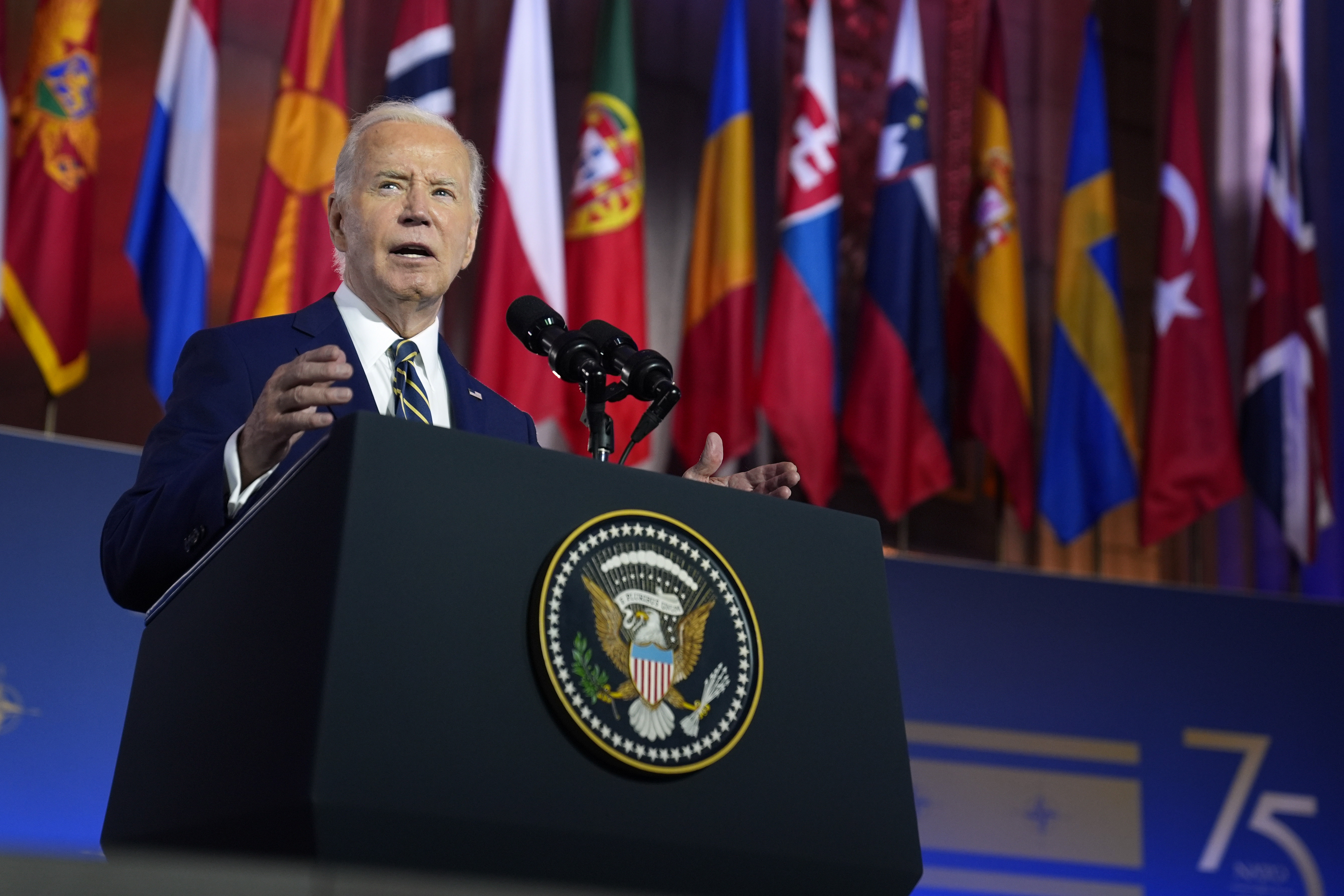Apprehensive allies gather in Washington to mark NATO’s 75 years of mutual defence
;Resize=(620))
Representatives of NATO nations gathered in Washington Tuesday for a landmark anniversary leaders’ summit, complete with a musical performance that could have rivalled Broadway.
But behind the celebratory air and the parade of flags in the hall where allies signed the Washington Treaty 75 years ago — launching the North Atlantic Treaty Organization — there was an air of political anxiety.
On Capitol Hill on Tuesday, Democrats debated behind closed doors whether President Joe Biden should end his re-election campaign in the face of mounting questions about his fitness to both lead the United States and speak for American interests in NATO for the next four years.
At the NATO summit, apprehensive allies pondered what might happen to the alliance if former president Donald Trump regains the White House in the upcoming presidential election.
U.S. President Joe Biden lauded increased defence spending among NATO member states and repeated calls for a united front against Russia’s invasion of Ukraine, as the NATO summit opened in Washington on Tuesday.
Meanwhile, behind closed doors, members of the alliance tried to hammer out language that would pave the way for Ukraine’s eventual NATO membership, despite the reservations of some nations and the outright objections of others.
The gathering of NATO leaders gets underway in earnest on Wednesday.
In his formal remarks, soon-to-retire Secretary General Jens Stoltenberg delivered a rallying cry for the war-ravaged Eastern European nation and reminded the assembled leaders of the likely consequences if Russia’s invasion succeeds.
“So the outcome of this war will shape global security for decades to come,” Stoltenberg said.
“The time to stand for freedom and democracy is now. The place is Ukraine.”

He acknowledged that supporting the government of President Volodymyr Zelenskyy was never a “given” for NATO — due to Moscow’s initial efforts at squeezing Europe’s energy supply and the lingering threat of nuclear war — but the alliance persevered.
“The reality is, there are no cost-free options with an aggressive Russia as a neighbour,” he said. “There are no risk-free options in a war.”
Trump has promised to settle the Russia-Ukraine war in one day — a prospect even the Russian ambassador to the United Nations has dismissed.
The former president also famously pledged to let Moscow “do whatever the hell it wants” to NATO allies who don’t keep up their defence spending commitments.
In his address to the anniversary celebration Tuesday night, Biden said he doesn’t believe the U.S. will retreat from its leadership role in the alliance and its obligations.
“A overwhelming bipartisan majority of Americans understand that NATO makes us all safer,” he said.
“The American people know all of the progress we’ve made in the last 75 years has happened behind the shield of NATO.”
A defence expert neatly captured the mood of the gathering in a recent discussion of what to expect during the next two days of meetings.
“So in some ways, this NATO summit is coming as sort of the best of times and the worst of times. The best of times, in the sense that the alliance knows what it’s about … It’s about deterring Russia,” said Max Bergmann of the Washington-based Center for Strategic and International Studies.
“But it’s also sort of the worst of times, obviously, because of the war in Ukraine, [the] challenges of ramping up European defence spending, concerns about the reliability of the United States.”

Ukraine — its future in NATO and the sort of assurances the alliance can offer it that it will be admitted after the war ends — is expected to dominate the agenda.
Bergmann said several allied nations are expected to sign individual security agreements with Ukraine, similar to the one Canada struck with Zelenskky’s government last winter.
“But the Ukrainians will leave somewhat, I think, disappointed,” he said, referring to the membership issue. “The question is how much of a ruckus is … created over the membership question.”
The possibility of Ukraine’s future NATO membership is being hotly debated among alliance leaders.
Dozens of foreign policy experts last week called on NATO members to avoid moving toward granting Ukrainian membership at the summit, warning that it would endanger the U.S. and allies and rupture the coalition.
If Ukraine is admitted, the group argues, Russia attacking Ukraine in the future would trigger NATO’s Article 5, which calls on allies to defend the member attacked.
Ben Hodges, a retired U.S. lieutenant-general speaking as NATO leaders meet in Washington, says Russia hasn’t been able to knock Ukraine out of the war. But he said Russia’s continued access to markets for products like oil, combined with a lack of Western will, have harmed Ukraine’s fight.
When he visited Ottawa last month, Stoltenberg revealed that NATO will station a senior civilian official in Kyiv to act as a liaison.
The alliance will also take over the coordination and provision of most international security assistance for Ukraine, including weapons shipments and training of fresh forces.
Stoltenberg also has pressed the allies to provide a sustained level of funding — roughly 40 billion euros — to keep the Ukrainian war effort going.
Ukraine has placed air defences at the top of its list of requests — a plea that took on greater urgency Monday following the Russian missile strike on a Kyiv children’s hospital and air raids that left as many as 41 dead across the country.
On Tuesday, the United States and other NATO allies agreed to send Ukraine dozens of air defence systems in the coming months — including at least four of the powerful Patriot systems that Kyiv has been desperately seeking to help fight off Russian advances in the war.





